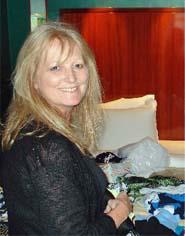 We are blessed to have Delores White, LPC-S, NCC, CART, NSOTP of Next Step Counseling and Education Center in Victoria and Luling, Texas, discus with us the topic of burnout and boundaries. Mrs. White provides treatment in several different areas, including family, relationship, and individual counseling. In addition, she also instructs at the University of Houston, Victoria. We are grateful for her expertise and knowledge and hope you enjoy her interview.
We are blessed to have Delores White, LPC-S, NCC, CART, NSOTP of Next Step Counseling and Education Center in Victoria and Luling, Texas, discus with us the topic of burnout and boundaries. Mrs. White provides treatment in several different areas, including family, relationship, and individual counseling. In addition, she also instructs at the University of Houston, Victoria. We are grateful for her expertise and knowledge and hope you enjoy her interview.
I have come to realize most individuals do not realize they are headed for burnout. So my first question was “What should people look for or what clues let people know they might be heading in the direction of burnout?” Mrs. White told me that many of the signs of depression are also similar to those who are burning out. Constant fatigue, anxiety, frustration, and a lack of empathy for those you are working with are all signs. The ongoing and constant feeling of just needing a break from what you are doing is a common theme as well.
Delores also told me that everyone has good and bad days. However, when consistency begins to set it, a few days, or a week of the same negative thoughts and feelings, that’s a pretty good sign a person should seek help. She cautioned us, if left untreated, these symptoms would continue to become worse and worse. She would like people to know there are stress management techniques that can be used in as little as two minutes while sitting at a desk, and that both prevention and restoration is possible.
Another common symptom of burnout would be sleeping all the time, or the exact opposite, having problems sleeping. She says this begins to be a physical problem as it allows our circadian rhythm, an internal time clock of sorts, to become disorganized. In a compounding situation, the inconsistency of sleep causes our serotonin levels to negatively change, and stress and mental fatigue get worse.
When I asked about boundaries and burnout, Mrs. White said this is a dangerous area for those who do volunteer work because they are generally pleasers and appeasers. These types of personalities generally have problems saying no. She gives the example of how a person’s name can be in the community as a dependable volunteer. As that person is asked by more and more organizations to help, there begins to be too much on the plate. If a person is unaware of how much they have going on, it can be easy for them to burnout quickly. She explained “You have your family, you have your home, you have this, this and this, you have this organization, and your work. So you have to be able to establish boundaries and say no. Doing it all is doing too much. You have to say no to keep good boundaries.”
Giving advice to keep from burning out, Delores encouraged weekend getaways at a minimum of once every three months. She says this helps to break the routine. Hobbies such as reading and gardening also surfaced. Most of the hobbies mentioned seemed to be low energy activities. It seemed important to our expert that people have family play time. “As you start interacting with the conversations and you notice the children play, it becomes a distraction to the work load and things that are causing you the burnout, and is much like a vacation”.
While the above tips were for prevention of burnout, she also told me these tips are great for recuperating from burnout as well. Yet, she did want us to know that it is easier to prevent it by establishing appropriate boundaries to begin with. She expressed the dangers of burnout telling me most aren’t able to completely love what they were doing in the same way as before the burnout. She also described telling others no after you have told them yes as being very difficult as well. In addition, many are not able to get the three days off to get away, and if they can, finances generally won’t allow it. Delores believes it is easier for the younger generation to fall into this trap, simply because of a lack of experience.
In closing the interview, Delores again touched on the topic of family time and boundaries. She believes the most important thing is to remember what is really important in life such as family, and to give those things the importance they deserve. Many people forget what is important to them, and let work and other less important matters take center stage when it shouldn’t.
Delores, I would like to personally and publically thank you for your time. The information and advice you gave us is perfect.
To those who are reading this, I hope you take her advice and place boundaries that allow the important things to remain important. Also, feel free to start a conversation and leave comments. If you enjoyed reading this and would like to keep up with Elijah’s Tree, please sign up for our eNews letter in the lower right hand side of this page, or the mid left hand side of our facebook.com/elijahstree3 page. Also, if you would like to contribute financially to help send those who minister on retreat, please click the donate now tab up at the top. Thank you for taking the time to read!